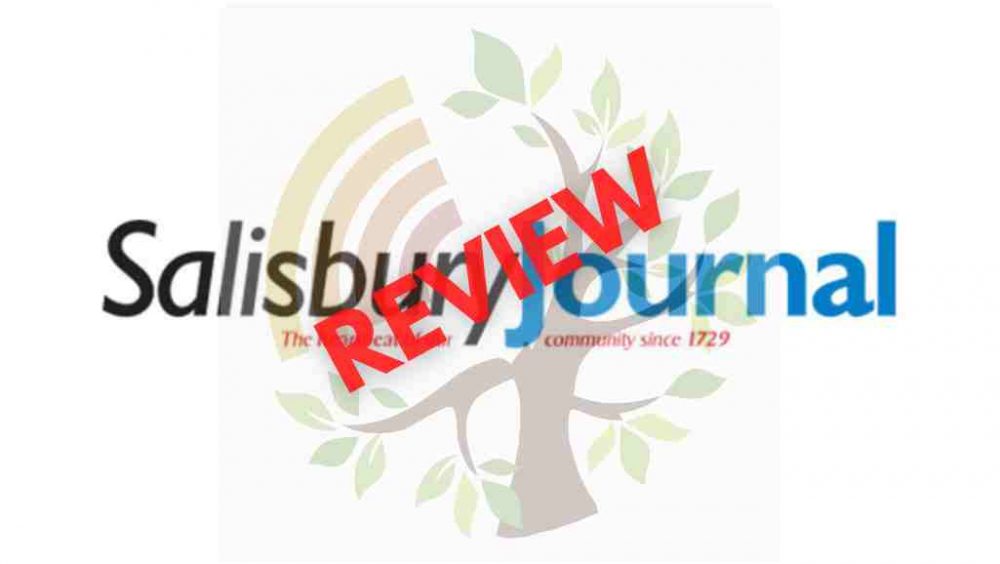But for a community newspaper published since 1729, it’s a very different face
Salisbury Journal opens new offices on Milford Street
This may be the most significant news story the Salisbury Journal has run for years. A ‘local’ newspaper once again opens its doors to the public, in the centre of the city it covers.
Like most local papers, having sacked most of its editorial staff over the past two decades, The Journal no longer needs large premises. For most local newspapers, Covid and working from home provided another chance to reduce overheads. The Journal is bucking the trend in re-opening its doors, putting up a sign, and establishing a physical presence.
Among the many huge impacts of the Internet on local newspapers, it has made local journalism more and more of a virtual business. Local newspapers these days barely require local human reporters, let alone bricks and mortar.
Once a venerable newspaper, now a case study in corporate zombification
We keep an eye on The Journal, as it was the pilot for our See Through News Newspaper Review Project. Its Review Facebook group still has the most comprehensive range of content, recounting the same litany of nearly all local papers over the past decade or so. Stories of corporate takeover, consequences of distant bean-counters taking over from local editors.
We chose our own local paper, but The Jouornal’s story is typical of 90% of all local newspapers around the world. It is true that The Journal’s corporate owners Newsquest, like their US parent company Gannett, and their hedge fund owners New Media Investment Group, are particularly keen on the automation of local news. They were among the first to print bylines with an entirely new category of hack – the ‘SEO Journalist’.
Having been in publication for nearly three centuries, the Journal has been around for longer than most, but the headline of its own recent story is depressingly familiar.
Independently-owned, cherished local title speaks truth to local power for generations, destroyed by Internet then sucked dry by corporate owners
The Salisbury Journal no longer requires a large newsroom. It’s well over a decade since their former premises were crammed with a couple of dozen bustling, hustling, smoking, sweating staff, shuttling in and out of its doors to gather news, pecking at keyboards to make the print deadline.
The Internet has destroyed the business model that sustained them for centuries – selling dead trees and the advertisements printed on them. Like their former competitors around the country, The Journal’s staff numbers have been methodically slashed ever since Newsquest hoovered it up.
The same fate has been met by local newspapers not just in the UK, but all over the world. Newsquest just happens to be a UK pioneer, hoovering up 200-odd titles from the Alloa Advertiser to the Yeovil Post, to become the UK’s biggest corporate local newspaper owner.
A few – less than 10% – of Britain’s local papers remain independently owned. These are either holdouts owned by old-school proprietors prepared to make a loss to serve their communities, or brave experiments owned by Internet-age pioneers, trying to find a way to somehow commit ethical local journalism while still paying the bills.
The Journal’s ultimate owner isn’t a local worthy, but a New York hedge fund. The vast majority of surviving local newspaper titles around the world are owned by remote corporate bosses, no longer by people living in the community on which they’re supposed to report.
As we document in our Newspaper Review Project, more and more of ‘local’ news content is generated by algorithms rather than journalists. All corporate local news agglomerators appear to be following the same moribund path, in their relentless quest to keep cutting costs and maintain the flow of dividends to their shareholders.
Don’t blame the staff
As we make clear in our Review Groups’ About descriptions, our criticism of the ethical consequences of this corporate zombification of local newspapers is directed at the boardroom, not at the newsroom.
Employers like Newsquest, or the UK’s other giant corporate agglomerator Reach Media, along with relative tiddler corporates Tindle and Iliffe, employ 90% of the UK’s local journalists.
Journalists have very little choice but to work for these cost-cutting, bottom-line-driven commercial giants. It must be hard, with mortgages to pay, to work for managers constantly nudging the dial away from the ethical journalism taught at university, and towards the User-Generated Content, clickbait, concealed advertorials and robot-written content that now passes for local news.
We wish the remaining Journal staff well in their new city centre home. We look forward to praising occasional outbreaks of ‘proper’ local journalism when they have a chance to escape their screens, punishing daily story quota, and click-driven ‘SEO Journalism’.
- May they have the time and energy to pause trawling social media for stories, turn off their workstation monitors, and walk out of their city centre office.
- May they have the time to meet their community face-to-face, knock on doors to introduce themselves, and stop strangers in the street for vox pop interviews.
- May they attend council meetings, listen to local bands, visit schools and cover coffee mornings and street protests in person .
- May they arrange to meet new contacts in their places of work, and swap gossip with old ones in coffee shops and pubs.
Good luck!

